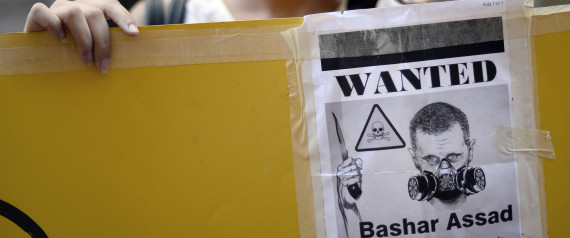
Picture Source: http://i.huffpost.com/gen/1378478/thumbs/n-SYRIA-WAR-CRIMES-large570.jpg?6
As many of you know, the government of Syria has already admitted to possessing chemical weapons. The United Nations has since confirmed that Syria’s use of chemical weapons has killed upwards of 1,400 people last month. (Public International Law and Policy Group). As a result of this, an international process for removing such chemical weapons from Syria has commenced. (Public International Law and Policy Group).
However, Syria is not party to the International Criminal Court, thus the ICC does not have jurisdiction over its war crimes unless the Security Council grants it. (ABC News). Due to this lack of jurisdiction, one possible alternative for prosecution can be through the use of a conflict-specific war crimes court, which we have seen utilized successfully in the past. (ABC News).
Recently, “a blue ribbon panel of former international tribunal chief prosecutors, international judges, and leading experts has prepared a Draft Statute for a Syrian Extraordinary Tribunal to Prosecute Atrocity Crimes.” (Public International Law and Policy Group). This draft statute has been named the “Chautauqua Blueprint.” (Public International Law and Policy Group) This push for a tribunal was organized by Michael Scharf, a Case Western Reserve Law Professor and Director of the Public International Law & Policy Group. (Public International Law and Policy Group). According to Scharf, “It can help the Syrian opposition demonstrate its commitment to the rule of law, ensure that accountability plays an appropriate role in peace negotiations, put Syrian officials and military commanders on all sides on notice of potential criminal liability, and lay the groundwork for justice rather than revenge in the immediate aftermath of transition.” (Public International Law and Policy Group). Further, former Chief Prosecutor of the Special Court for Sierra Leone—David Crane—stated that, this initiative provides “useful framework for not only the Syrians but regional and international organizations to assist in the creation of an appropriate justice mechanism.” (Public International Law and Policy Group).
Keeping in mind what you read above, please consider the following questions:
(1) Do you believe the establishment of a tribunal in Syria is necessary to ensure accountability of war crimes?
(2) Human Rights Watch spokesperson Richard Dicker brought up an interesting point this past Friday, stating that “top suspects should be tried in The Hague because if they have been on the losing side of a conflict they are unlikely to receive a fair trial at home…What makes ICC involvement so critical is…that atrocities have been committed on both sides…[and] it is imperative that you have impartial application of the law.” (ABC News). With that being said, do you agree with the comments made by Richard Dicker? Or do you think that a war crimes tribunal would be the most effective method to punish top suspects?
Article Sources: (1) Public International Law and Policy Group (2) ABC News
To comment on the first question, I do believe there needs to be a tribunal in Syria to ensure the accountability of war crimes. 189 nations were parties to the Chemical Weapons Convention of 1993 to destroy the stockpile of Chemical weapons. 165 nations signed the convention and 65 states had their legislatures ratify the convention that went into effect in 1997. It is clear that the world is against the use of chemical weapons, which are 1 of the 3 weapons of mass destruction. If there is enough evidence against Assad and his government that they used it on civilians than they should be held accountable. War Crimes are universally condemned by nations and if a tribunal is not set up then it sends a bad precedent to future atrocities that the ICC and international deterrence of war crimes are trying to prevent and punish. They run the risk of losing credibility.
In response to the second question, I do believe leaders brought up on war crimes should be tried at the Hague because the severity of charges for war crimes should be tried under the most impartiality. After a conflict, the winner most likely will not try to use justice seeking procedures, but most likely run of the mill procedures just to say they did when in actuality they are just after revenge. Trying suspected war criminals at the Hague puts more faith and credibility into the international justice system.